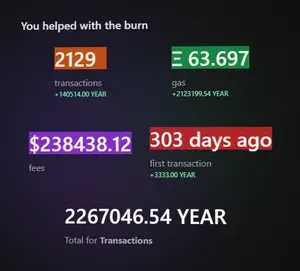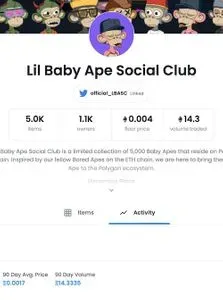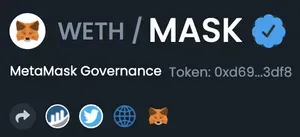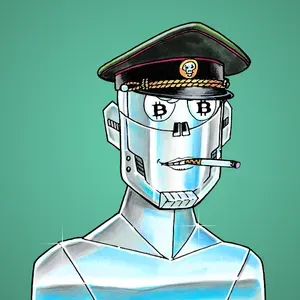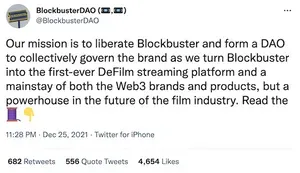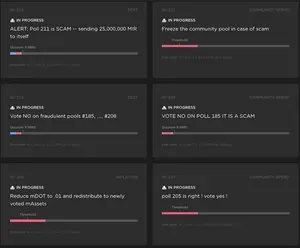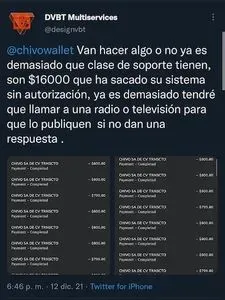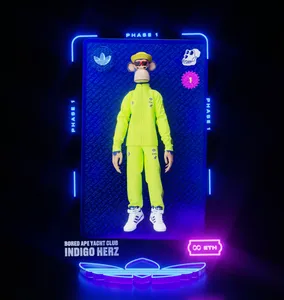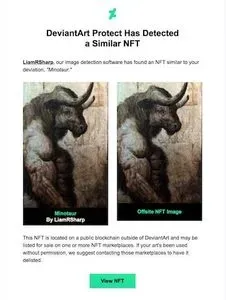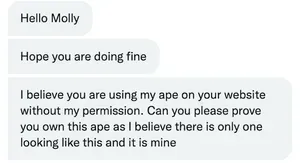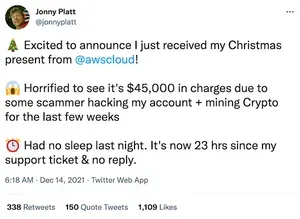Square Enix CEO acknowledges he will be disappointing gamers who "play to have fun" with his announcement that they are getting into web3
$YEAR creator rings in the New Year by rugpulling about $225,000
- "Airdrop culture could pose integral threat to DeFi industry", Cointelegraph
- "Ethereum Project Airdrops Scam Token, Then Pulls the Rug", Crypto Briefing
NFT collector scammed out of $2.2 million in a phishing attack
"I been hacked. all my apes gone." tweeted Kramer, in a phrase that ultimately became a catchphrase of the NFT world (and its critics).
After asking for help on Twitter, OpenSea froze the stolen assets, preventing them from being traded on their platform. Some commenters noted that the redress (asset freezing and flagging of suspicious accounts) was only possible because OpenSea is a centralized platform with a large amount of power in the NFT arena, which some see as antithetical to the supposed ideals of web3. This also raises the question of whether BAYC themselves have a way to determine "legitimate ownership" of their NFTs, which in addition to being expensive status symbols also grant their owners exclusive perks including merchandising rights and access to events.
p>Blatant copy of Solana's popular "Baby Ape Social Club" rakes in more than $50,000 before being taken down by OpenSea
"1st LGBTQ+ Cryptocurrency" brings pinkwashing to crypto
"No network can withstand the electricity consumption that is recorded there", says energy company chairman of the effects of cryptocurrency mining in Georgia
Traders duped out of $1.8 million in a fake MetaMask governance token scheme
- "Fake MetaMask Governance Token Soars 2600% and Gets Rug-Pulled", CryptoPotato
- "$1.8M Lost to Fake MetaMask Token Honeypot Scam", Crypto Briefing
Rapper Waka Flocka Flame has an OpenSea account hacked to the tune of $19,000
MetaSwap Gas project rugpulls about $600,000
MetaDAO project rugpulls for more than $3.2 million
- "MetaDAO Makes Off With $3.2M in Rug Pull", Cryptobriefing
Another NFT project sells NFTs depicting real people without their consent
The "Cipher Punks" NFT project tried to sell NFTs with illustrations of various cypherpunks, or at least the ones that were listed on Wikipedia. The project said that it intended to "[honor] everyone involved in the CypherPunk movement. They are our heroes, and we need to recognize them". Apparently honoring them did not also involve asking for their consent to be used in the project, as Jillian York tweeted on December 26, "I don't approve of this whatsoever and would like it removed."
ItsBlockchain, the group behind the project, subsequently announced that they would scrap the project and apologized. This apology rang a little hollow, to me, after they retweeted a tweet saying "never meet your heroes" in reference to the individuals asking that the project stop using their likeness without their consent, for their own profit.JungleFreaks and Sandbox NFTs are stolen from a collector
A DAO forms with the goal of "liberating" Blockbuster, hoping to raise $5 million from NFTs
Elon Musk tweeting a photograph of his dog in a Santa suit somehow pumps a memecoin
An attempted governance attack aims to defraud 25 million MIR (about $64.2 million) from Terra's Mirror protocol
Steve Bannon touts a "Fuck Joe Biden" coin that looks designed to scam investors
NFT collector scammed out of Bored Ape NFT: "This was my kids college. My mortgage."
Open source contributors and advocates are surprised to find photographs of themselves being sold as NFTs
Funko Pop launches Bob Ross NFTs in apparent disregard of Ross's wishes
Visor Finance is hacked for about $8.2 million
- "$8.2M Lost as Visor Finance Suffers Latest DeFi Hack", CryptoBriefing
Another Discord scam earns its perpetrators about $150,000
Traders hoping to get in on the "Monkey Kingdom" NFT collection are duped by a scam link in the project's official Discord
Either a rug pull or a hack drains at least $1.8 million from Bent Finance
Dozens of users report money disappearing from their El Salvadoran Chivo Wallet accounts
Grim Finance is exploited for $30 million
Adidas learns the hard way that limiting the number of NFTs one person can buy is hard
Prominent comics artist says continuous theft of his work for use as NFTs may force him to close his DeviantArt gallery
Multiple artists report OpenSea automatically closing their support tickets reporting stolen artwork; OpenSea removes ability to report
S.T.A.L.K.E.R. 2 receives so much fan pushback on planned NFTs that the studio scraps the idea within a day
NFT collector who owns the NFT associated with the Bored Ape artwork used in this site header would like me to stop using "their" ape
Melania Trump announces an NFT collection which will begin with a painting of her "cobalt blue eyes"
Tweet from a crypto miner answers the question of where all the GPUs went
Another typing error proves costly to an NFT collector
Laurent Correia rug pulls $960,000 with his abandoned "Billionaire Dogs" NFT project
The project had an underwhelming reception, and the team quickly decided to reduce the supply of available NFTs from 6,500 to 2,000. Two days after launch, the funds were transferred out of the project wallet and to various addresses, including $400,000 which went to Correia. The project also deleted their website, Discord, and Twitter account that week.
Correia, for his part, has continued to post on his "Laurent BILLIONAIRE" Instagram account, where he shows off his private jet and tropical vacations with no mention of the Billionaire Dogs Club. His "NFT" Instagram story shows his pricey NFT purchases beginning on January 14.
A hacker racks up a $45,000 AWS bill for their victim, only to generate $800 worth of Monero
Bug in major cryptocurrency trackers shows wildly inaccurate data
Fans are outraged when the Twitter account of now-deceased Stan Lee shills an NFT
Artist Loish searches her name on OpenSea and finds 132 NFTs created from her artwork without permission
A collection of NFTs seeks to profit off the murder of George Floyd, with no apparent connection to or approval from his family
Vulcan Forged users lose a collective $135 million in hack
The Seattle Kraken NHL team, whose home stadium is named the Climate Pledge Arena, raise eyebrows with an NFT release
Typing error costs NFT trader nearly $300,000
Fable creator Peter Molyneux announces an NFT game where you run a company town
Cryptocurrency exchange Ascendex hacked for $77 million
McDonalds NFT project overshadowed by a possible link to a racial slur
Crowdfunding website Kickstarter announces it will abandon its current platform in favor of a blockchain implementation
A "decentralized exchange", dYdX, is taken down in an AWS outage
Ubisoft announces it will be shoehorning NFTs into its Tom Clancy game
- "Ubisoft's NFT Announcement Has Been Intensely Disliked", Kotaku
- "Gamer-hate: Ubisoft’s new NFT project video gets 96% dislike ratio", Cointelegraph
- "Ubisoft's first NFT plans make no sense", Ars Technica
- "Ubisoft Devs Don’t Understand Company’s NFT Push, Either", Kotaku
- "No One’s Buying Ubisoft’s Garbage Ghost Recon NFTs", Kotaku
8ight Finance completely drained after private key leak
WildWorks angers its fans by announcing it will be moving into crypto gaming
WildWorks later split Cinder into a separate company, Cinder Studios. However, in early 2023, the studio shutdown, giving its employees no advance notice that they would soon be out of a job.


